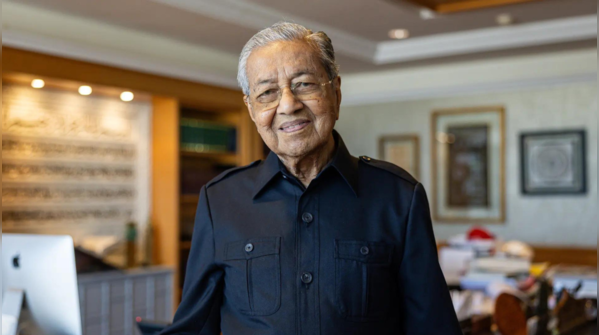
1/7
How to live a long and happy life
Turning 100 is no small thing, especially when one has lived a life in the public eye, with purpose, pressure, and politics. On July 10, 2025, Dr Mahathir Mohamad, Malaysia’s longest-serving prime minister, crossed this incredible milestone. What sets him apart isn’t just his age, but the clarity with which he still speaks, the sharpness in his thought, and the way he continues to engage with the world around him. Dr Mahathir offered a peek into the lifestyle and philosophy that helped him reach this age with grace and grit.
There’s no magic pill here, no overused clichés. Instead, what emerges is a life of discipline, deep curiosity, and deliberate choices. This story isn’t just about a man who lived to 100; it’s about how he did it without letting his body or mind rust.(Image credit: GettyFeed)

2/7
Staying physically active without overdoing it
“You have to remain active, sit down, and just do nothing that is bad for your health,” Dr Mahathir told The Straits Times.
The advice may sound simple, but the wisdom runs deeper. Dr Mahathir doesn’t follow a high-intensity gym routine. He simply avoids inactivity. Whether it's walking, attending meetings, or staying mobile in everyday tasks, he believes movement prevents the body from slipping into decline.
Ageing is closely linked with muscle loss (sarcopenia) and reduced cardiovascular function. Regular low-impact movement, like walking, stretching, or household chores, keeps the blood flowing and muscles engaged. According to a study, light daily movement is more sustainable than strenuous workouts in older age, and it significantly reduces the risk of falls, cognitive decline, and frailty.

3/7
The mind needs to be exercised, just like the body
“If you don’t use your brain, it begins to regress, begins to forget things… I read. I write. I talk with people. I give lectures,” Dr Mahathir explained.
This isn’t multitasking, it’s mental nourishment. Dr Mahathir doesn’t let his brain idle. Whether through writing opinion pieces, engaging in dialogue, or reading daily news, he makes sure the brain is actively challenged.
A study found that older adults who engage in intellectual hobbies, like reading, writing, or speaking regularly, are less likely to develop dementia. It’s not about IQ, but about cognitive engagement. The brain, like a muscle, strengthens with use. Dr Mahathir’s ability to articulate ideas at 100 is a living testament to that.

4/7
Purpose over retirement: Why he never fully “stopped”
Even after stepping away from formal office, Dr Mahathir didn’t retreat from life. He continued to write, advise, and participate in public discussions.
No passive retirement here.
Many imagine retirement as a break from responsibilities. But for Dr Mahathir, purpose remained central. He never treated rest as disconnection; he treated it as a redirection.
People who find meaning and purpose in later years, whether through community service, mentoring, or creative projects, report better mental health and even lower mortality rates. Having a reason to get up every morning may just be a quiet, underrated key to longevity.

5/7
Emotional strength and a sharp sense of discipline
Dr Mahathir’s political journey was far from smooth. He has faced criticism, international pressure, and intense personal and political challenges. Yet, he rarely showed signs of burnout or emotional breakdown.
While he doesn’t explicitly speak about meditation or mindfulness, his disciplined emotional regulation, remaining calm under pressure, may have helped shield his body from chronic stress.
Chronic stress is known to speed up cellular ageing by shortening telomeres (the protective ends of chromosomes). A paper links emotional regulation and longevity, suggesting that the way stress is handled has a direct impact on ageing. Dr Mahathir’s longevity might also be partly due to how he processed challenges without letting them consume him.

6/7
No indulgence in harmful habits
Dr Mahathir has always been vocal about moderation in food, clean living, and avoiding smoking or alcohol. He doesn’t follow fad diets or intense nutritional trends. Instead, he maintains balanced, modest meals and avoids overindulgence.
This isn’t about restriction, but restraint.
Long-lived individuals often eat in moderation, favouring traditional, whole foods and limiting ultra-processed items. Caloric moderation, especially after age 60, has been associated with reduced risk of metabolic diseases, which aligns with Dr Mahathir’s habits.

7/7
A lifetime of curiosity and constant learning
Dr Mahathir is still curious, about ideas, people, the world. He continues to engage with younger generations, share his experiences, and evolve his perspectives.
This mental adaptability is rare but essential. He didn’t allow age to become a barrier to growth.
Curiosity and openness to learning are strong predictors of neuroplasticity, the brain’s ability to form new connections even in old age.
[This article is for informational purposes only and is based on the verified public statements of Dr Mahathir Mohamad, as reported in The Straits Times. It does not serve as medical advice.]
Follow Us On Social Media

 6 hours ago
44
6 hours ago
44




























 English (US)
English (US)